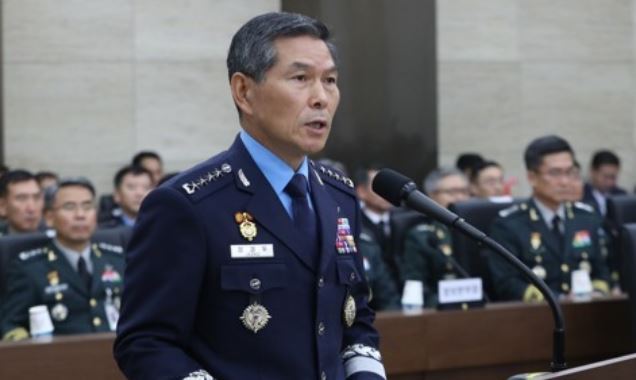South Korea is pushing to develop an indigenous counter-rocket system to fend off persistent threats from North Korea's forward-deployed long-range artillery, Seoul's Joint Chiefs of Staff said Monday.
In its report to the parliamentary audit, the JCS said that the state-run Agency for Defense Development has been working to develop core technologies for a rocket interception system that employs a "hit-to-kill" platform.
The project comes amid concerns that the South is not sufficiently ready to handle threats from the North's border artillery targeting Seoul and its surrounding areas.
"We are considering deploying the interceptor system to counter the enemy's volley of rocket attacks targeting our key military installations such as the wartime command headquarters and facilities for the Korea Air and Missile Defense system," the JCS said in the report.
The South Korean military reportedly considered purchasing a foreign "counter-rocket artillery mortar" system such as the Iron Dome developed by Israel to counter attacks from the Hamas militant group.
But it has apparently decided not to buy the Israeli system due to various reasons, such as its cost effectiveness and the Korean Peninsula's mountainous terrain, which would pose hurdles to its operation.
In its report to the parliamentary audit, the JCS said that the state-run Agency for Defense Development has been working to develop core technologies for a rocket interception system that employs a "hit-to-kill" platform.
The project comes amid concerns that the South is not sufficiently ready to handle threats from the North's border artillery targeting Seoul and its surrounding areas.
"We are considering deploying the interceptor system to counter the enemy's volley of rocket attacks targeting our key military installations such as the wartime command headquarters and facilities for the Korea Air and Missile Defense system," the JCS said in the report.
The South Korean military reportedly considered purchasing a foreign "counter-rocket artillery mortar" system such as the Iron Dome developed by Israel to counter attacks from the Hamas militant group.
But it has apparently decided not to buy the Israeli system due to various reasons, such as its cost effectiveness and the Korean Peninsula's mountainous terrain, which would pose hurdles to its operation.

"The Iron Dome is a system suitable for defending against sporadic strikes from the irregular warfare forces such as the Hamas group," the JCS explained. "But it is not suited to handling attacks using long-range artillery pieces, which come all at once."
Defense discourse here has focused largely on countering the North's strategic weapons systems such as ballistic missiles and nuclear arms, while attention to more direct threats -- long-range artillery and multiple rocket launchers -- appears to be insufficient, observers said.
Pyongyang is known to possess a variety of rocket systems, including 170 mm-caliber self-propelled howitzers and 240 mm multiple rocket launchers that can put Seoul and its vicinity within range.
The North's longer-range 300 mm multiple rocket launcher is seen as more formidable, as it is capable of reaching key US military installations in Pyeongtaek in Gyeonggi Province, and the headquarters of the South's Army, Navy and Air Force in the Gyeryongdae military compound in South Chungcheong Province.
According to the South's 2016 defense white paper, the North has a total of 14,100 artillery pieces including 5,500 multiple rocket launchers, a majority of which have been deployed near the military demarcation line.
The South, however, has only 5,900 artillery pieces including just 200 multiple rocket launchers.
During the session, JCS Chairman Gen. Jeong Kyeong-doo vowed to carry out a far-reaching reform to transform the military into a reliable fighting force and better handle the security threats from the North.
Tensions are running high, with Pyongyang being seen as likely to stage another provocation in protest against the ongoing naval drills between Seoul and Washington.
"We are making all-out efforts to transform our military into a high-morale force that outfights (its adversaries) and is trusted by citizens through sweeping defense reforms," Jeong said.
"While maintaining and developing the robust South Korea-US alliance and its combined defense posture, I will work to strengthen our military's capabilities, posture and resolve to ensure that no one dare to threaten the lives and safety of our citizens," he added.
Portraying the current security situation as "graver than ever," Jeong also pledged all-out efforts to effectively cope with the North's escalating security challenges from all domains, including cyberspace.
"We will muster all our capabilities to dispel people's security concerns by proactively responding to the threats from the North's nuclear and other weapons of mass destruction, long-range artillery and cyberattacks," he added. (Yonhap)









![[Hello India] Hyundai Motor vows to boost 'clean mobility' in India](http://res.heraldm.com/phpwas/restmb_idxmake.php?idx=644&simg=/content/image/2024/04/25/20240425050672_0.jpg&u=)









